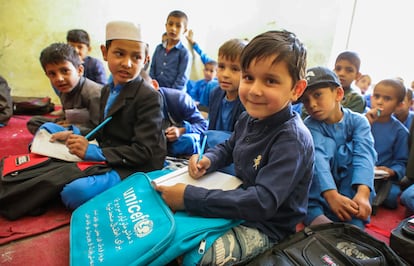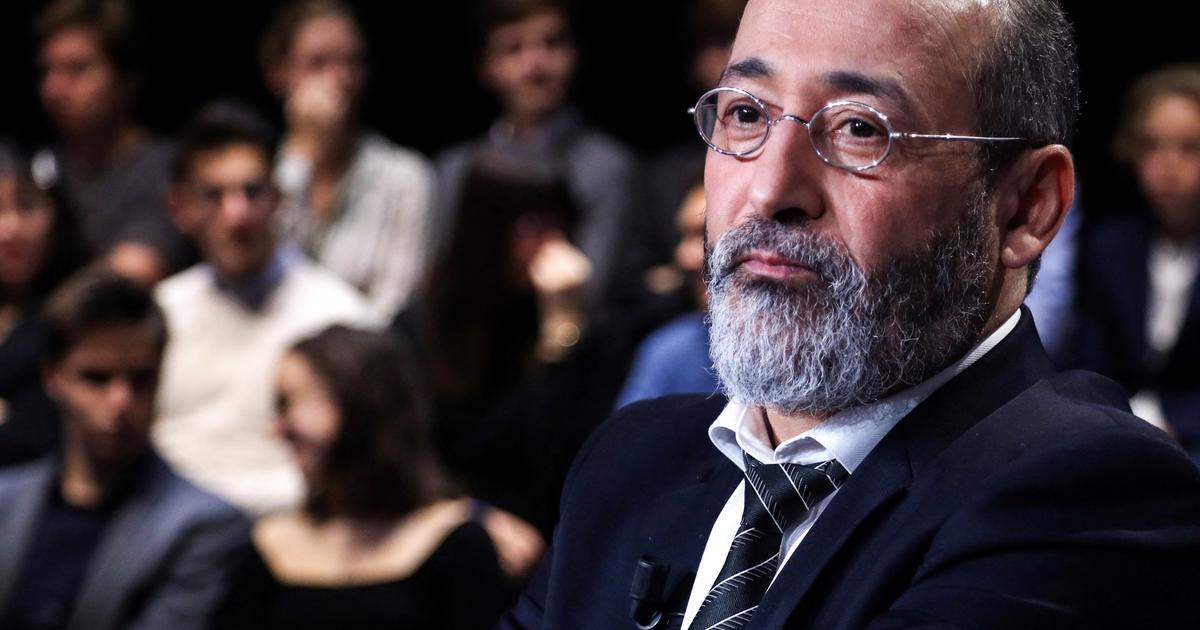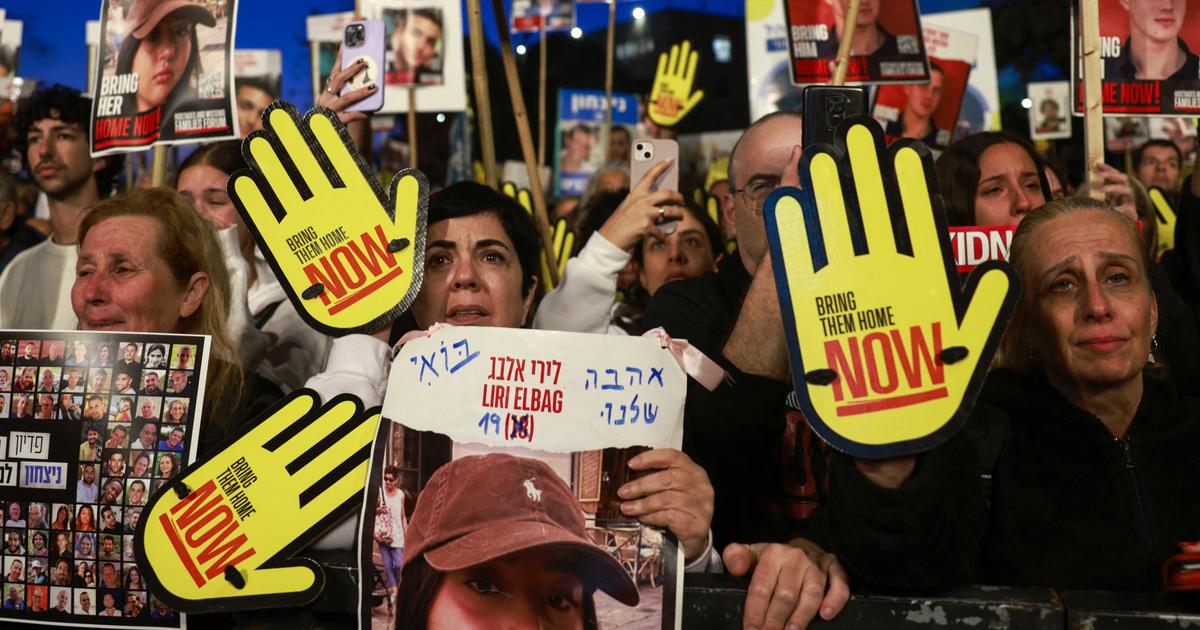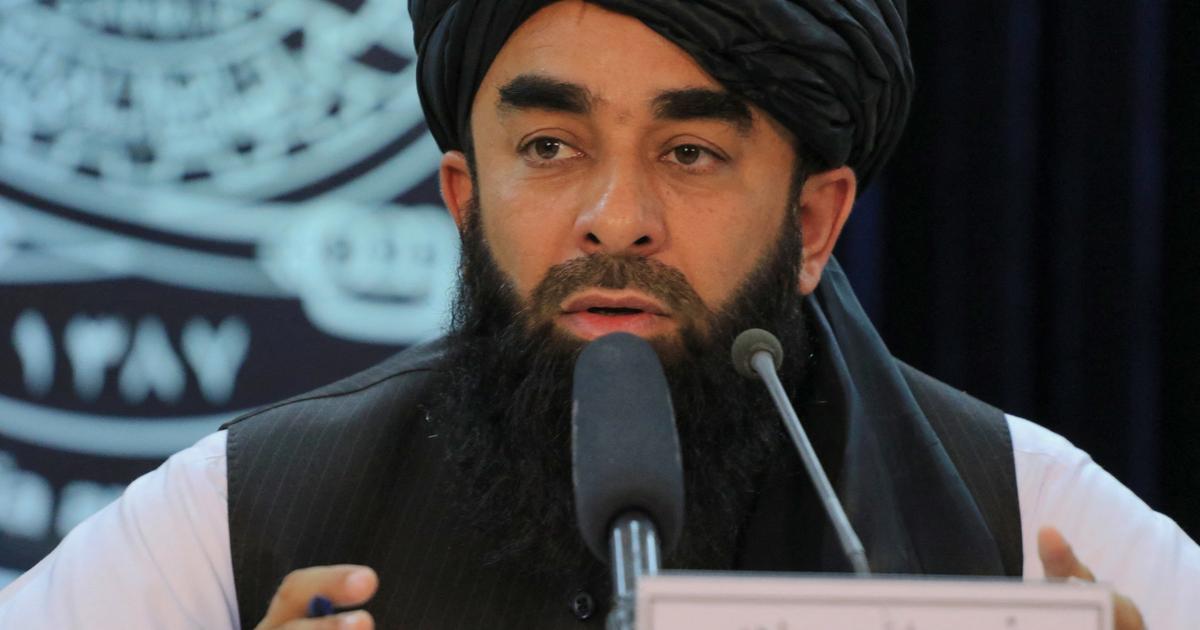On the first anniversary of the Taliban's rise to power in Afghanistan, I can't help but look back.
To last April, when I had the opportunity to spend a few days in the country, witnessing the harsh reality that children are experiencing and how Unicef works to provide them with the essential services that they need so much.
During this year, the situation of Afghan children has only worsened.
Just a few weeks before my arrival, UNICEF had carried out the longest road mission of any UN security unit in the last 20 years, making its way to arrive with health, nutrition, water, sanitation and education teams. to the remotest corners of Afghanistan.
A team of 14 people covered more than 2,000 kilometers from Kandahar, passing through Urozgan, Helmand and Nimroz, near the border with Iran.
Two thousand kilometers of villages, they told me, now accessible to humanitarian staff, who never left the country and remained providing essential services to the children of Afghanistan.
I had the opportunity to travel by road south of Kabul, through the Tera pass, surrounded by endless mountains that stretched skyward in all directions.
This land, for thousands of years, was a place of passage for travelers from all over the world.
Today, however, it tells a very different story.
On the outskirts of Kabul, we meet many children on the streets.
A very small girl begs money for her family in the middle of the road.
Another boy is hard at work carrying fruit and vegetables at one of the market stalls lining the road.
We are in the second week of the holy month of Ramadan and the shops are overflowing with fruit and vegetables.
But no customers are seen in any market.
The economic crisis in Afghanistan has had a devastating impact on the daily lives of its inhabitants.
When, in 2021, most foreign aid was frozen, the most essential basic services collapsed and the income of families disappeared.
24 million people, more than half of them children, live below the poverty line and need immediate humanitarian assistance to survive.
In Kabul and elsewhere, markets are filled with bountiful goods that few Afghans can afford.
24 million people, more than half of them children, live below the poverty line and need immediate humanitarian assistance to survive
We soon realized that the empty stalls contrasted with where we headed next, after a three-hour drive: Paktya Regional Hospital in Gardez, where dozens of families filled a waiting room to overflowing.
That hospital is one of more than 2,300 health facilities across the country that UNICEF, along with the World Health Organization (WHO), is supporting.
It cares for more than 75,000 patients throughout the Paktya province.
As the fighting in recent months has ceased, more Afghans are able to seek medical attention, which is a great relief for the children and their parents.
But with such a recent increase in demand, pressure is also increasing on an extremely precarious health sector.
To help prevent the system from collapsing, UNICEF and WHO are providing supplies of medical supplies and medicines, paying staff salaries and training needed to keep services running.
As soon as we arrived at the hospital, I was guided to a treatment room for children with severe acute malnutrition.
The first girl I met was called Rana, six months old, who was already being evaluated.
Six-month-old Rana is held by her mother, Sayera, 20, in the Outpatient Department of Paktya Regional Hospital in Gardez city. Omid Fazel (© UNICEF/UN0627073/Fazel)
Rana's mother, Sayera, told us that her daughter refused to drink her breast milk.
The baby had no appetite and had lost too much weight in the last few weeks.
A nurse measured Rana's arm circumference and confirmed what Sayera already feared: her daughter was severely malnourished and she needed immediate treatment.
Sayera told me that her family eats bread and tea for breakfast, and rice and potatoes for lunch and dinner, the only staples they can afford.
His is part of the 90% of households in Afghanistan that don't have enough to eat.
This year alone, some 3.2 million children are expected to be severely malnourished across the country.
This year alone, some 3.2 million children are expected to be severely malnourished across the country.
As we walked to another part of the room, Niamatullah Zaheer, the director of the health center, told me that his staff was overwhelmed.
The hospital's only pediatrician regularly examines more than 100 children a day.
Even the neonatal unit is overwhelmed.
Too often, the hospital is forced to accommodate more than one baby per bed.
We arrive at an area of the hospital reserved for children with severe acute malnutrition, who are closely watched until they are sufficiently recovered to return home.
It was there that Basmina caught my attention: a little girl (I was told she was four years old) sitting on her bed in the corner of the room.
I walked over to greet her and she smiled back at me.
It was not the first time that Basmina had been in this room.
Ella's sister Jamillah de ella, 13, is the one who accompanies her whenever she has to go back to the hospital and stay there.
The girls lost their mother and her father lost his job.
After a few weeks of hospital treatment, Basmina recovers enough to return home.
But her family has little access to nutritious food and clean water, so time and time again, Basmina's health deteriorates and Jamillah has to take her back to the hospital.
As I listened to the story of these sisters, a reality that nurses witness every day, the director asked me to pass on a message on my return home: what the hospital staff is doing for these children would not have been possible without the support of the international community.
But the needs only grow.
On my second morning in Afghanistan I was able to make a visit that I had long awaited.
I visited the Halima Khazan school, also in Gardez, where some 2,000 girls and 460 boys attend classes.
The building was imposing and was named after the province's first female high school graduate, Halima Khazan, who later assumed responsibility for women's affairs in Paktya and used her position to promote women's education. girls.
Six-year-old Omar sits with his classmates in his first grade classroom at Halima Khazan School in the city of Gardez. Omid Fazel (© UNICEF/UN0627661/Fazel)
That “torch” that she lit at the school is now held by 40 teachers, almost all of them women, and an extraordinary director, named Nisreen, who told us: “Many of the teachers are mothers.
We need a nursery for your children, or we fear losing them.
The school also needs a well so that the students can drink clean water.”
Our education specialists were taking notes on needs that we know we can help alleviate.
UNICEF has spent decades providing clean water and sanitation to schoolchildren around the world, and our educational programming extends to supporting teachers, especially women.
Nisreen took us to the classrooms for sixth form girls, who were having an art lesson just then.
I asked them what they liked to draw the most: “Horses!” they said.
And her favorite subject? “Writing!”
Two students stood in front of everyone to show us what they had learned that day in class.
Her joy at being able to go to school and learn was so palpable it took my breath away.
At that time we did not know if these wonderful and studious girls will be able to go on to seventh grade.
To this day, we still don't know.
Two first graders sit in class at Halima Khazan School. Omid Fazel (© UNICEF/UN0627657/Fazel)
After being with them, I went to another area of the school.
The first graders were learning the alphabet and numbers.
I sat in the girls' class and asked them, "What do you dream of doing when you grow up?"
One of them surprised us all by shouting ambitiously: “I want to be a policewoman!”
All of us who were there laughed with joy and applauded her enthusiasm.
That enthusiasm and that hope are still with me.
We cannot abandon any of these children.
Schools are much more than places to learn: in these difficult times in Afghanistan, they are also a safe space to access a healthy meal a day and clean water.
They are a refuge from the street, from violence.
Schools are much more than places to learn: in these difficult times in Afghanistan, they are also a safe space to access a healthy meal a day and clean water.
They are a refuge from the street, from violence
Unicef has been in Afghanistan for more than 70 years, always present, has never left the country and has never stopped helping.
Now more than ever.
We continue to support community schools and teacher salaries.
We continue to provide millions of textbooks and school supplies to children.
We are providing nutrition programs and ensuring access to clean and safe water for health workers and school children.
But everything Unicef does is with the continued support of the international community.
And that support is in jeopardy.
Afghanistan's children must not be held hostage by politics.
The de facto authorities and the donor communities must find ways to work together.
That is why I urge the international community to give Unicef and the organizations working in Afghanistan the funding we need to continue providing vital aid, so that we can continue to support treatment for malnutrition, girls' education and access to clean water. potable.
We urge the de facto authorities to fulfill their promises to protect the rights of children and women, and guarantee the right to education for all children in Afghanistan.
The actions we take today will determine the future of millions of children in Afghanistan, their survival and their access to a decent life, growing up healthy, educated and safe.
You can follow PLANETA FUTURO on
,
and
, and subscribe
to our 'newsletter'
here
.









